Abstract
OBJECTIVES: To examine the association of plasma caffeine concentrations during pregnancy with fetal growth and to compare this with relations with reported caffeine intake. DESIGN: Prospective population based study. SETTING: District general hospital, inner London. SUBJECTS: Women booking for delivery between 1982 and 1984. Stored plasma was available for 1,500 women who had provided a blood sample on at least one occasion and for 640 women who had provided a sample on all three occasions (at booking, 28 weeks, and 36 weeks). MAIN OUTCOME MEASURE: Birth weight adjusted for gestational age, maternal height, parity, and sex of infant. The exposures of interest were reported caffeine consumption and blood caffeine concentration. Cigarette smoking was assessed by blood cotinine concentration. RESULTS: Caffeine intake showed no changes during pregnancy, but blood caffeine concentrations rose by 75%. Although caffeine intake increased steadily with increasing cotinine concentration above 15 ng/ml, blood caffeine concentrations fell. Caffeine consumption was inversely related to adjusted birth weight, the estimated effect being a 1.3% fall in birth weight for a 1,000 mg per week increase in intake (95% confidence interval 0.5% to 2.1%). The apparent caffeine effect was confined to cigarette smokers, among whom the estimated effect was-1.6%/1000 mg a week (-2.9% to -0.2%) after adjustment for cotinine and -1.3% (-2.7% to 0.1%) after further adjustment for social class and alcohol intake. Adjusted birth weight was unrelated to blood caffeine concentrations overall (P = 0.09, but a positive coefficient), after adjustment for cotinine (P = 0.73), or among current smokers (P = 0.45). CONCLUSIONS: Smokers consume more caffeine than non-smokers. Blood caffeine concentrations during pregnancy are not related to fetal growth, but caffeine intake is negatively associated with birth weight, with this effect being apparent only in smokers. The effect remains of borderline significance after adjustment for other factors. Prudent advice for pregnant women would be to reduce caffeine intake in conjunction with stopping smoking.
Full text
PDF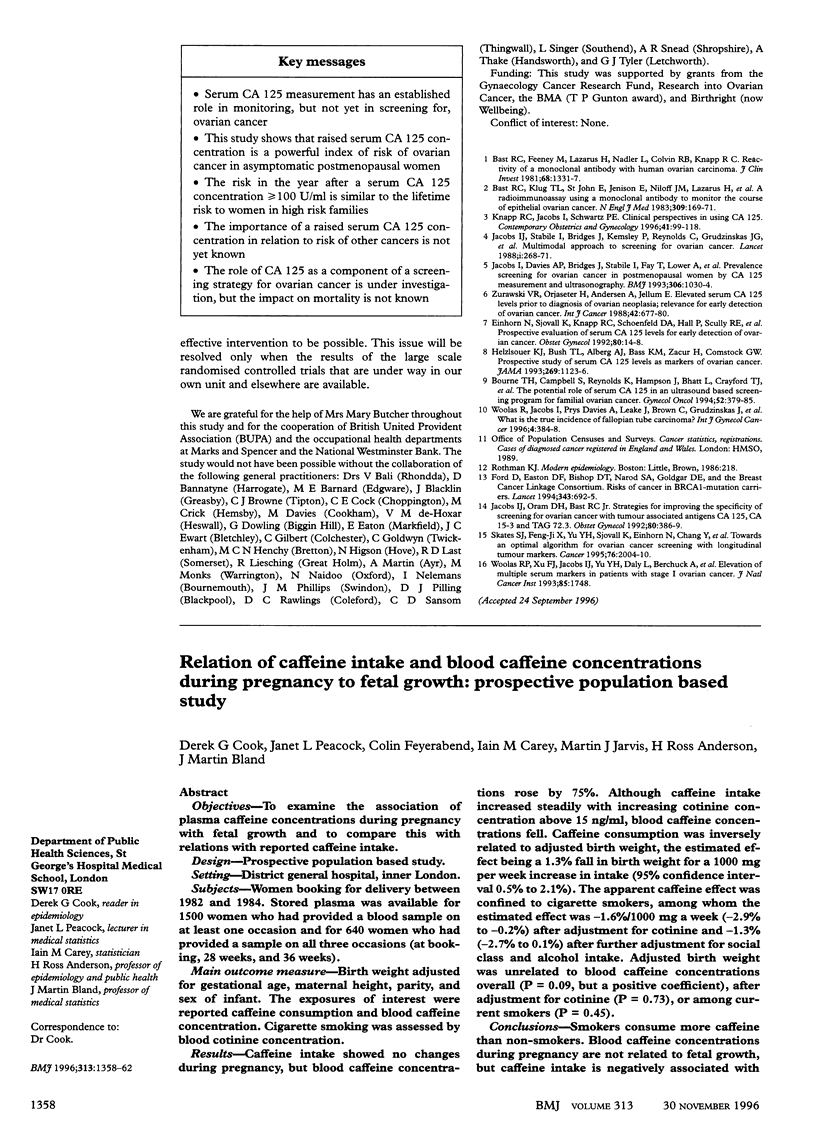
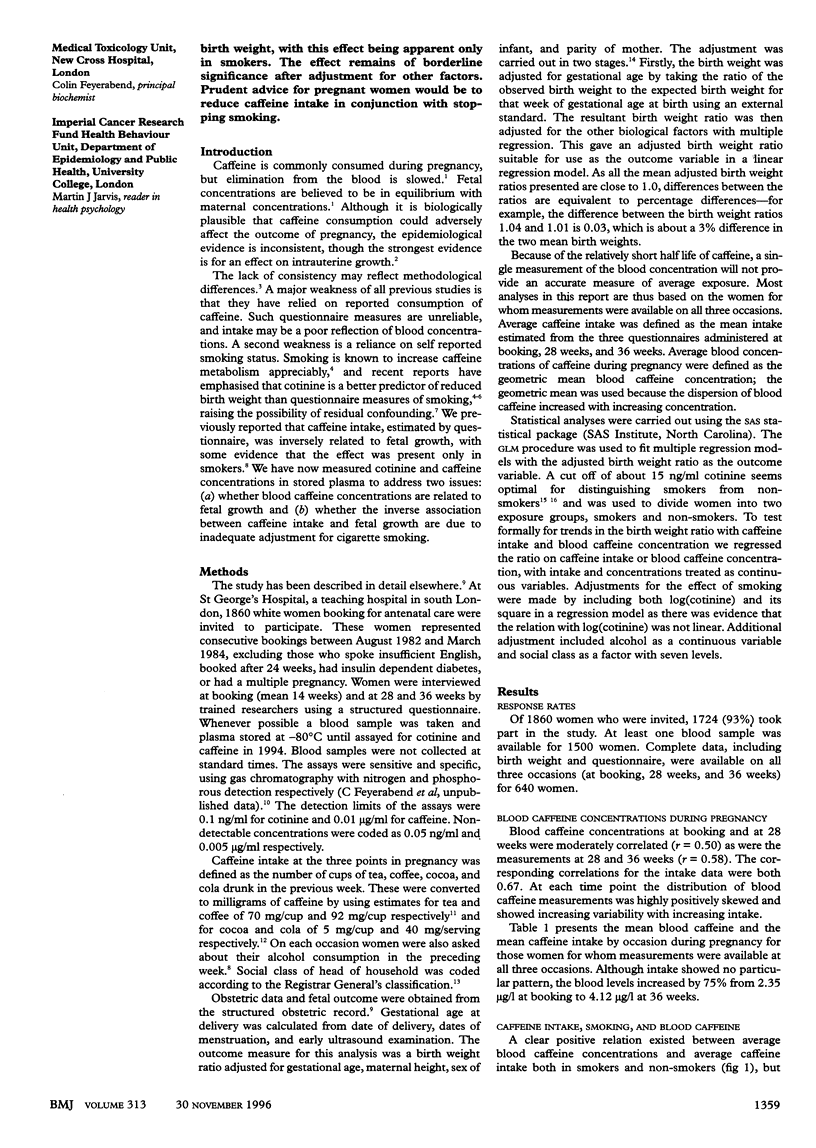
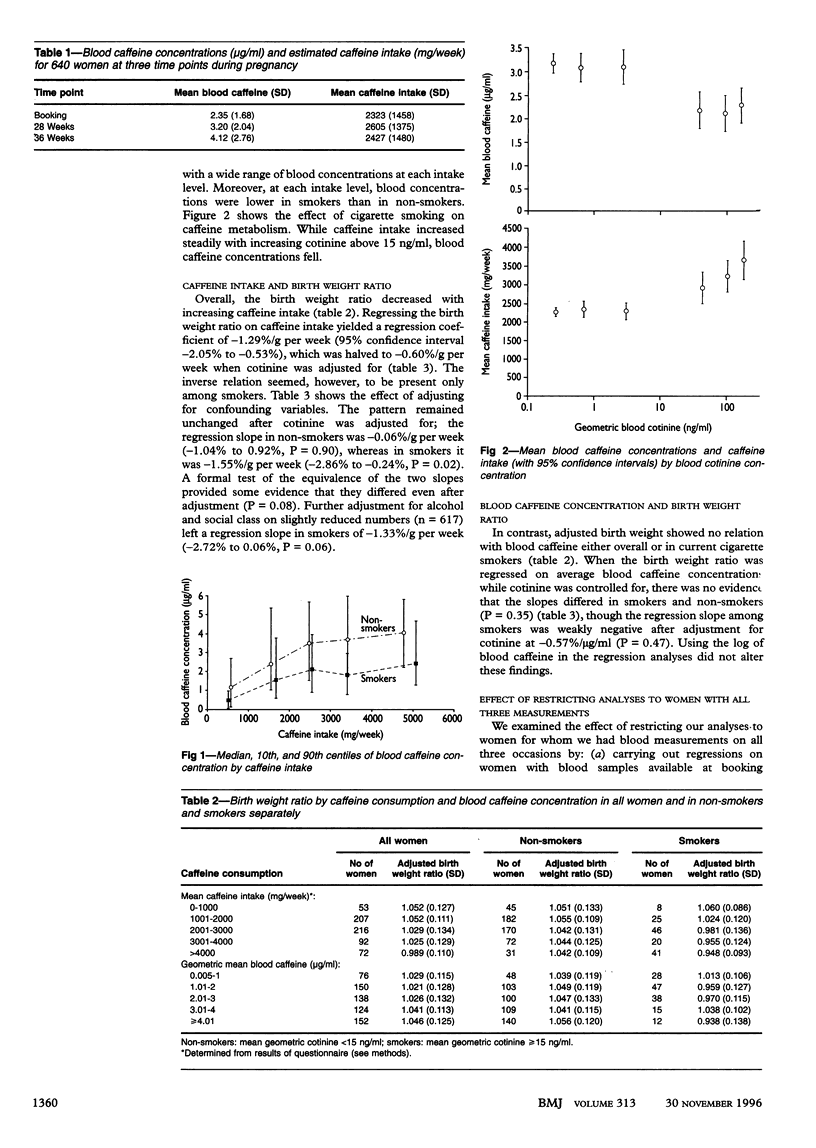
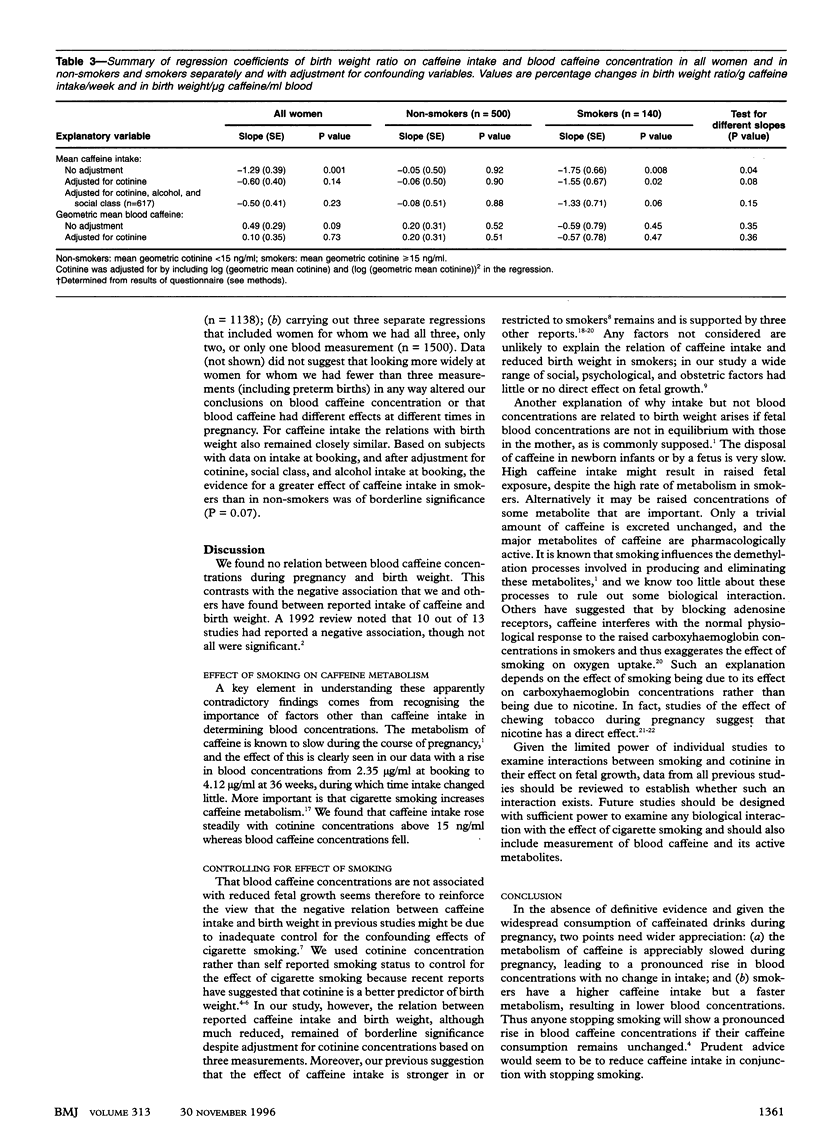
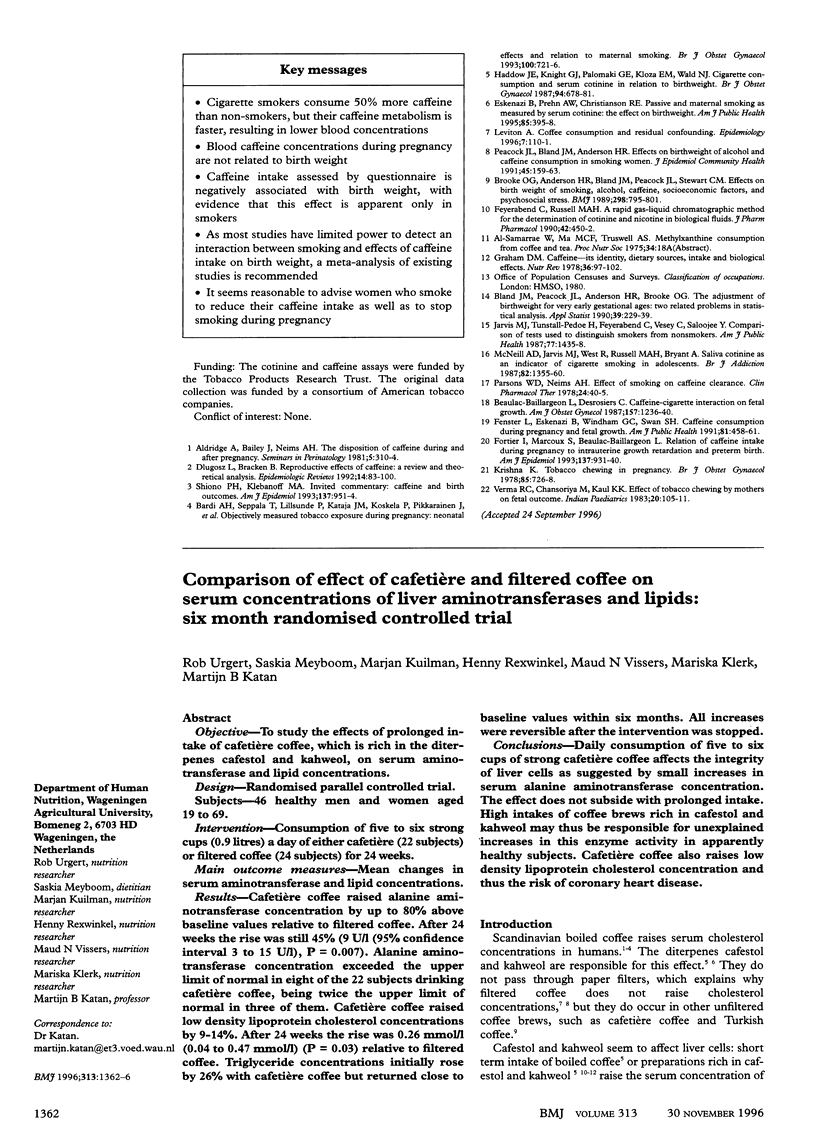
Selected References
These references are in PubMed. This may not be the complete list of references from this article.
- Aldridge A., Bailey J., Neims A. H. The disposition of caffeine during and after pregnancy. Semin Perinatol. 1981 Oct;5(4):310–314. [PubMed] [Google Scholar]
- Bardy A. H., Seppälä T., Lillsunde P., Kataja J. M., Koskela P., Pikkarainen J., Hiilesmaa V. K. Objectively measured tobacco exposure during pregnancy: neonatal effects and relation to maternal smoking. Br J Obstet Gynaecol. 1993 Aug;100(8):721–726. doi: 10.1111/j.1471-0528.1993.tb14262.x. [DOI] [PubMed] [Google Scholar]
- Beaulac-Baillargeon L., Desrosiers C. Caffeine-cigarette interaction on fetal growth. Am J Obstet Gynecol. 1987 Nov;157(5):1236–1240. doi: 10.1016/s0002-9378(87)80301-0. [DOI] [PubMed] [Google Scholar]
- Brooke O. G., Anderson H. R., Bland J. M., Peacock J. L., Stewart C. M. Effects on birth weight of smoking, alcohol, caffeine, socioeconomic factors, and psychosocial stress. BMJ. 1989 Mar 25;298(6676):795–801. doi: 10.1136/bmj.298.6676.795. [DOI] [PMC free article] [PubMed] [Google Scholar]
- Delzell E. Beyond social class. Epidemiology. 1996 Jan;7(1):1–3. doi: 10.1097/00001648-199601000-00001. [DOI] [PubMed] [Google Scholar]
- Dlugosz L., Bracken M. B. Reproductive effects of caffeine: a review and theoretical analysis. Epidemiol Rev. 1992;14:83–100. doi: 10.1093/oxfordjournals.epirev.a036093. [DOI] [PubMed] [Google Scholar]
- Eskenazi B., Prehn A. W., Christianson R. E. Passive and active maternal smoking as measured by serum cotinine: the effect on birthweight. Am J Public Health. 1995 Mar;85(3):395–398. doi: 10.2105/ajph.85.3.395. [DOI] [PMC free article] [PubMed] [Google Scholar]
- Fenster L., Eskenazi B., Windham G. C., Swan S. H. Caffeine consumption during pregnancy and fetal growth. Am J Public Health. 1991 Apr;81(4):458–461. doi: 10.2105/ajph.81.4.458. [DOI] [PMC free article] [PubMed] [Google Scholar]
- Feyerabend C., Russell M. A. A rapid gas-liquid chromatographic method for the determination of cotinine and nicotine in biological fluids. J Pharm Pharmacol. 1990 Jun;42(6):450–452. doi: 10.1111/j.2042-7158.1990.tb06592.x. [DOI] [PubMed] [Google Scholar]
- Fortier I., Marcoux S., Beaulac-Baillargeon L. Relation of caffeine intake during pregnancy to intrauterine growth retardation and preterm birth. Am J Epidemiol. 1993 May 1;137(9):931–940. doi: 10.1093/oxfordjournals.aje.a116763. [DOI] [PubMed] [Google Scholar]
- Graham D. M. Caffeine--its identity, dietary sources, intake and biological effects. Nutr Rev. 1978 Apr;36(4):97–102. doi: 10.1111/j.1753-4887.1978.tb03717.x. [DOI] [PubMed] [Google Scholar]
- Haddow J. E., Knight G. J., Palomaki G. E., Kloza E. M., Wald N. J. Cigarette consumption and serum cotinine in relation to birthweight. Br J Obstet Gynaecol. 1987 Jul;94(7):678–681. doi: 10.1111/j.1471-0528.1987.tb03174.x. [DOI] [PubMed] [Google Scholar]
- Jarvis M. J., Tunstall-Pedoe H., Feyerabend C., Vesey C., Saloojee Y. Comparison of tests used to distinguish smokers from nonsmokers. Am J Public Health. 1987 Nov;77(11):1435–1438. doi: 10.2105/ajph.77.11.1435. [DOI] [PMC free article] [PubMed] [Google Scholar]
- Parsons W. D., Neims A. H. Effect of smoking on caffeine clearance. Clin Pharmacol Ther. 1978 Jul;24(1):40–45. doi: 10.1002/cpt197824140. [DOI] [PubMed] [Google Scholar]
- Peacock J. L., Bland J. M., Anderson H. R. Effects on birthweight of alcohol and caffeine consumption in smoking women. J Epidemiol Community Health. 1991 Jun;45(2):159–163. doi: 10.1136/jech.45.2.159. [DOI] [PMC free article] [PubMed] [Google Scholar]
- Shiono P. H., Klebanoff M. A. Invited commentary: caffeine and birth outcomes. Am J Epidemiol. 1993 May 1;137(9):951–958. doi: 10.1093/oxfordjournals.aje.a116765. [DOI] [PubMed] [Google Scholar]


